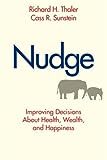
Advertising is arguably responsible for more damage to our planet than any other human activity. More than manufacturing. More even than oil and coal extraction. That’s because the £900 billion or so spent every year on advertising and marketing across the world fuels our desire for ‘stuff’ and keeps the consumerist flames burning bright.
But it is possible that advertising may soon shrug off its reputation as the bad guy when it comes to global warming. Just as advertising has been a major contributor to the world’s environmental problems, could it soon become a major part of the solution to those problems? Instead of destroying the world, can advertising help save it?This is the question being posed by a new breed of advertising executive who think that the tricks and wiles of Madison Avenue — updated with new understanding of how human beings make choices, may be our planet’s best hope of survival.
Behavioural economics
That new understanding is ‘behavioural economics’. It’s been around for a while now, most famously in the works of Richard Thaler and Cass Sunstein who wrote the best selling book Nudge (subtitled Improving Decisions About Health, Wealth, and Happiness). It might just be our best hope for the profound behaviour change, we need to save our species, according to Colwyn Elder, executive at UK-based ‘sustainability communications’ consultancy’ The Hunting Dynasty.
“If we want Earth to survive in something like the form we know it, we are going to have to change our behaviour. But where will the drivers for that change come from?” asks Elder. Legislation can help, but is often seen as draconian and intrusive.
You’d think that common sense arguments about the consequences of over-consumption would work. But one of the lessons of behavioural economics is just how irrational we can be. For instance we are deeply in thrall to the power of ‘now’. Human beings engage most with the present and discount the future, -even when it’s their own future. “That’s why anti-smoking messages took so long to be effective and that’s why messages telling people to consume less generally fall on deaf ears,” explains Elder.
explains Elder.
Behavioural economics can help in two ways, she argues. “Firstly it can help change purchase behaviour. So it can help steer us to less damaging consumption, such as buying electric cars rather than petrol cars. But more profoundly it can help change our life-style behaviour. So instead of driving it might help persuade us to walk or cycle.”
It’s a new way of looking at the choices people make and it gains its power by tapping into deep-rooted behaviours and attitudes that developed over the course of hundreds of millions of years of our evolution, -some of them from before we were even human. “It uses insights from evolutionary psychology to explain human irrationality for the first time,” says Elder. “The evidence is that it can be very powerful in encouraging behaviour change.”
Recent advances in neuroscience have shown that human beings are ‘cognitive misers’. That is, our brains use so much energy that we prefer to do as little fresh thinking as possible. Instead we favour various mental shortcuts or ‘heuristics’. These shortcuts can be dangerous because they can lead us to make unwise choices –such as putting off important decisions to give up smoking, or polluting our planet.
The power of social norms
But they also allow us to be shepherded into wise decision making. Oliver Payne, founder of The Hunting Dynasty, views the “irrational behaviours” of Behavioural Economic theory through the lens of communication, and has identified 19 different strategies, or psychological levers that can be pulled to persuade people to change the way they consume.
Possibly the most powerful is ‘the social norm’ otherwise known as ‘herding’ or ‘shoaling’. For nearly all organisms there is an inbuilt tendency to do what the rest of the flock, herd or tribe is doing. That way individuals are more likely to avoid becoming lunch for the first passing predator.
The urge to do what everyone else is doing is a powerful instinct, located deep in our lizard brain. Yet it is surprisingly easy to trigger. One of the best examples of the social norm at work comes from a hotel in Phoenix Arizona. The hotel wanted to reduce its laundry -to save money and help the environment. It put signs in the bathrooms asking guests to reuse towels ‘to help save the environment’. 30 percent of guests complied. When they inserted the phrase ‘three quarters of guests who stayed in this room reused their towels,’ compliance rose to 50%.
“A simple change of phrase nearly doubled cooperation. That change alone would save 7 trillion gallons of water if every hotel on the planet did it,” says Elder.
Framing
Another important lever for behavioural economic device is ‘framing’- the mental and emotional filters people use to intepret and respond to events. This means that it is quite possible to change people’s behaviour if a task is recast in a new light.
So in a Swedish train station everyone used a tiny escalator, despite the wide staircase next to it. Overnight the station managers made each step into a real live treadable piano key. With speakers, and in tune. Anyone who walked up the stairs would play notes up or down the piano scale. The minor chore of climbing the stairs had been re framed as a game. It made walking fun, and reportedly led to a 66% increase in stair use.
Loss aversion
Yet another valuable insight from behavioural economics is the loss aversion heuristic. The pain of losing what you have is far greater than the pleasure of gaining what you don’t have. Losing $100 hurts far more than winning $100 gives pleasure, despite the identical value of the money involved. In fact economists have found that the odds of equivalent pain to pleasure are approximately 2:1. People will work about as hard to avoid losing $50 as they will to earn $100.
This has significant policy implications and they aren’t necessarily related simply to money. They can just as well be focused on intangibles like reputation. The Yale Environmental Sustainability Index is a country-by-country relative measurement. One year Norway came second. The prime minister – rather than crowing about Norway’s success – wanted to overtake Finland to become number one.
One of the problems with case studies and anecdotes is that given the wisdom of hindsight they invariably make things seem tidier and more orderly than they actually were. There is also the danger that these examples may create the impression that minute changes can easily galvanise people into extreme behavior change. That may be true –but rarely.
However as Elder puts it: “We need mass behaviour change soon to reduce our carbon consumption. It wont happen on its own and it won’t happen in time to stop climate change unless we give people a good push in the right direction. Right now these techniques look like our best bet.”
ENDS